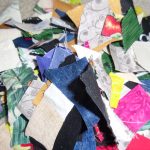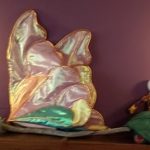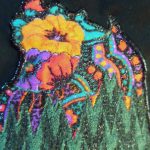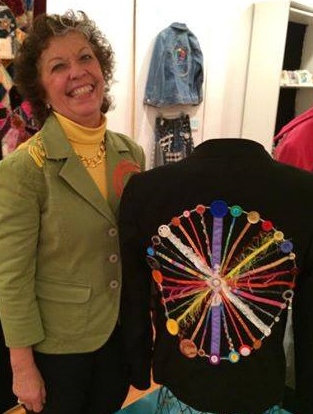I am sometimes warmly known as the “Scrap Lady.”
 I help CASIGYs™ create beauty and benefit from life’s scraps. Many CASIGYs™ sense your innate differences from an early age, and conclude that you don’t belong. You may feel that what you received in the metaphorical gene lottery is nothing but a pile of scraps in your lap. And when a CASIGY™ faces tough times, such as relationship, school or work difficulties, illness, loss, trauma or other adversity, it can feel like life has left you with nothing but scraps.
I help CASIGYs™ create beauty and benefit from life’s scraps. Many CASIGYs™ sense your innate differences from an early age, and conclude that you don’t belong. You may feel that what you received in the metaphorical gene lottery is nothing but a pile of scraps in your lap. And when a CASIGY™ faces tough times, such as relationship, school or work difficulties, illness, loss, trauma or other adversity, it can feel like life has left you with nothing but scraps.  his time of adversity my life. While grappling with having lost my health and searching for (and fortunately finding) how to rebuild it, I also recovered my creativity and deepened my perspective on life. I discovered and developed what I later came to refer to as Creative and Contemplative Handwork™, a way of making things with one’s hands which demonstrates one’s inner experience and facilitates psychic transformation. I learned it from Jungian Analyst and author Clarissa Pinkola Estes PhD, Leslie Verdi, LCSW, Pat Allen, PnD, and from Shawn McNeff, PhD.
his time of adversity my life. While grappling with having lost my health and searching for (and fortunately finding) how to rebuild it, I also recovered my creativity and deepened my perspective on life. I discovered and developed what I later came to refer to as Creative and Contemplative Handwork™, a way of making things with one’s hands which demonstrates one’s inner experience and facilitates psychic transformation. I learned it from Jungian Analyst and author Clarissa Pinkola Estes PhD, Leslie Verdi, LCSW, Pat Allen, PnD, and from Shawn McNeff, PhD. When I was young, I didn’t know that there was any other kind of people except those who were Creative, Acutely Aware, Super-Sensitive, Intense and/or Gifted, since my family is full of people with these traits. I had to learn later how to be ‘out there’ in the world, around these less sensitive, not-so-aware, not-so-creative people. I eventually learned that they were considered to be ‘normal’ people, and I was considered odd. Learning about giftedness helped me to understand that my oldest son’s insistence on demanding to know the relevance of a household chore that I gave him before agreeing to do it, was not just his own obstinacy and stubbornness, but that this lunacy (my point of view, of course) was very common for many CASIGY™ teens. It helped me understand my youngest son’s sensitivity. We would have a house full of boys for the night; they would all play the  same games and watch the same movies. He would be the only one to wake up in the night with a nightmare. And he would do it almost every time. It also helped me understand some of the struggles of my middle son, who joined our family at age 18. He’s and artist and a techie at the same time. This knowledge about CASIGYs™ has also helped me understand the sensitivities of my three daughters’-in-law and my grandchildren as well. And this life-learning of course informs my work with CASIGY™ families as I help them find harmonious ways of living together.
same games and watch the same movies. He would be the only one to wake up in the night with a nightmare. And he would do it almost every time. It also helped me understand some of the struggles of my middle son, who joined our family at age 18. He’s and artist and a techie at the same time. This knowledge about CASIGYs™ has also helped me understand the sensitivities of my three daughters’-in-law and my grandchildren as well. And this life-learning of course informs my work with CASIGY™ families as I help them find harmonious ways of living together.
 Creative blocks can be torturous. Making time for creative expression can also be difficult, and this need is often not understood by those who don’t have it. Creative people often experience what is considered to be attention difficulties; distractability, hyperfocus, inability to focus on things that seem irrelevant to them, and more. My own challenges in this area, and the learning this has necessitated, along with the work helping my clients with these and similar issues through the years informs my current work helping creative people thrive, heal, become fully alive and fulfill their creative destinies.
Creative blocks can be torturous. Making time for creative expression can also be difficult, and this need is often not understood by those who don’t have it. Creative people often experience what is considered to be attention difficulties; distractability, hyperfocus, inability to focus on things that seem irrelevant to them, and more. My own challenges in this area, and the learning this has necessitated, along with the work helping my clients with these and similar issues through the years informs my current work helping creative people thrive, heal, become fully alive and fulfill their creative destinies.  primary specialty. I’m delighted that I did because it has helped both my clients and me. Because of both my personal and professional experience, my clients tell me that they feel like I “get” them, understand who they are, where they are coming from, and what they have been through. Because of our similarities, more of my clients readily understand and can use the tools and ideas I share. And, I’m not sitting here banging my head on the wall wondering why I can help some people but not others.
primary specialty. I’m delighted that I did because it has helped both my clients and me. Because of both my personal and professional experience, my clients tell me that they feel like I “get” them, understand who they are, where they are coming from, and what they have been through. Because of our similarities, more of my clients readily understand and can use the tools and ideas I share. And, I’m not sitting here banging my head on the wall wondering why I can help some people but not others. 
